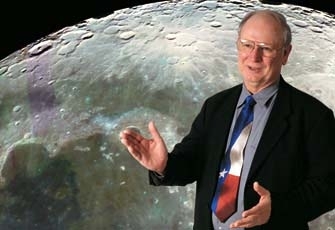Criswell, David (About the EoE)
Criswell, David
| Topics: |
David Criswell (1941-), an American physicist who, along with Robert D. Waldron, invented the concept of the Lunar Solar Power System (LPS). Their system calls for solar energy to be collected on the lunar surface by converters that feed the energy to microwave generators, which would then transmit the power to several thousand receivers around the Earth. Each receiver would capture a microwave beam and supply commercial electricity to regional power grids that would continuously provide the equivalent of about two kilowatts per person. The system includes manufacturing solar arrays on the moon from lunar materials, and assembling the arrays on the moon. Criswell and Waldron argue that a LPS producing 20,000 gigawatts of electricity would require 4,400 workers on the moon, 340 in low-lunar orbit, and 400 in low-Earth orbit. While most apsects of the LPS are technically feasible, cost considerations have thus far limited its implementation. Criswell currently acts as Director of the Institute for Space Systems Operations at the University of Houston.
Further Reading
- U.S. Senate Committee on Commerce, Science & Transportation. Testimony of Dr. David R. Criswell at Senate Commerce, Science, and Transportation Subcommittee on Science, Technology, and Space Hearings: “Lunar Exploration”.
- University of Houston, Institute for Space Systems Operations
